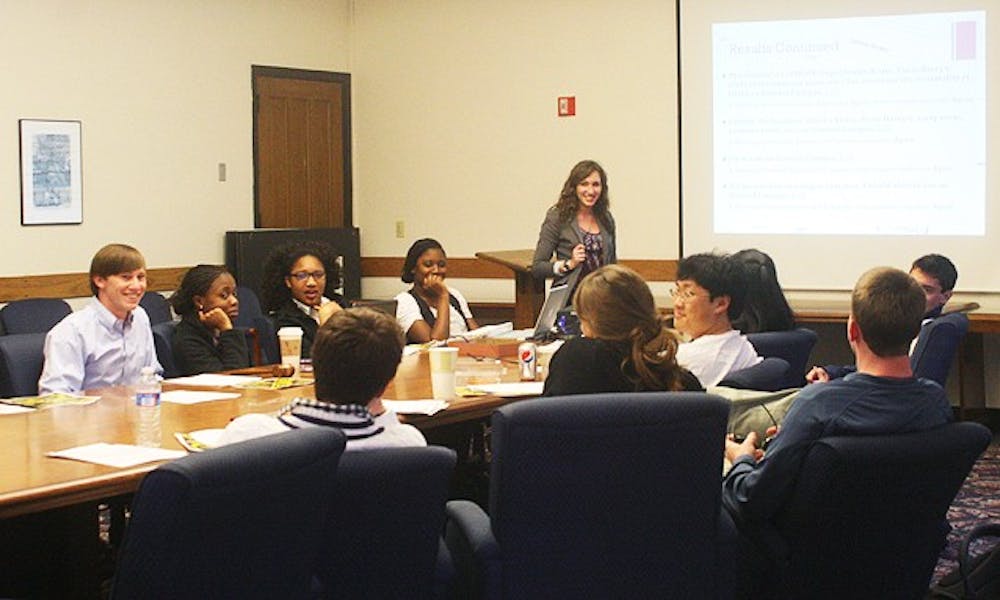More of students' residential programming fee could go directly to their quads beginning next year.
In its last scheduled meeting, Campus Council recommended to increase the amount of the student programming fee allocated directly to quads or houses in order to better accommodate the house model and the new state of residential programming.
“Under the house model, we envision houses will create very strong communities,” said Campus Council Treasurer Leslie Andriani, a junior.
Andriani noted that the creation of these new communities in the house model will be facilitated by “high-quality, high-impact programming,” adding that this will require more money.
In the next year, the increased residential programming fee will make it easier for quad councils to enact programming, as some quad councils often use up all of their funding and then request more from Campus Council.
“[Quad councils] won’t have to request so much of those funds or go through the request process, which sometimes deters people from requesting funds,” Andriani said.
In conjunction with the change to the residential programing fee, the council created a new, fund-distributing body, the Residential Finance Committee. The committee will manage the council’s finances throughout the rest of the year and serve as an aggregate rollover base for residential funding in 2011-2012 and then under the house model.
According to the council recommendations, in the year before the house model is implemented, the RFC will obtain its income from the Campus Council, Quad and Central Campus Council rollover funds from the previous year. It will also receive $5 per West or Central Campus resident, an allocation from the residential programming fee. The RFC will also have the ability to grant allocations of larger than $1,000 to student groups or individuals.
Under the house model, however, the RFC will forfeit its allocation from the residential programming fee and instead hold the rollover from the previous year.
“Almost the full amount that can be allocated from the [residential programming fee] is going directly to house councils, which is vital for the house model to be successful,” said Campus Council President Stephen Temple, a senior.
Instead, the RFC will obtain unused funds from house councils and distributing funding for residential programs hosted by house or neighborhood councils, or individuals.
RFC’s composition under the house model will be left to the discretion of Duke Student Government and the Residence Life and Dining Committee. In the interim year however, RFC will be chaired by someone chosen by DSG’s Residence Life and Dining Committee, and include six other members. Two will be senators from the Residence Life and Dining Committee, one from East Campus Council, one from Central Campus Council and two additional members from West Campus Quad Councils.
The council also recommended that East Campus Council receive more money from the residential programming fee, as opposed to quad fees. This measure will give house councils more money, in order to allow for greater flexibility. It will become effective in 2011-2012 and will continue after the house model takes effect, as East Campus will not be affected by the enactment of the house model.
The council also voted to give the Duke University Union a one-time transfer of $46,800 to be used exclusively for Old Duke, an annual concert that will take place April 15 in Keohane Amphitheater.
“DUU would like to continue Old Duke,” Andriani said. “It’s just that they don’t have the money in their budget.”
In other business:
Joe Gonzalez, associate dean for residence life, gave a presentation on improvements being made to Central Campus. Changes include additions to Mill Village and the Devil’s Bistro, erecting fencing around Central, the completion of the Central Promenade and the repainting of many buildings.
Residence Life and Housing Services is still working on its “beautification” project, which includes the replacement of picnic benches, trash cans and other improvements on Central.
“Central Campus is definitely not the campus your parents knew,” Gonzalez said.
This article has been modified to show that the residential programming fee will not increase next year, rather the portion going directly to quads or houses will be increased. The Chronicle regrets the error.Get The Chronicle straight to your inbox
Signup for our weekly newsletter. Cancel at any time.

